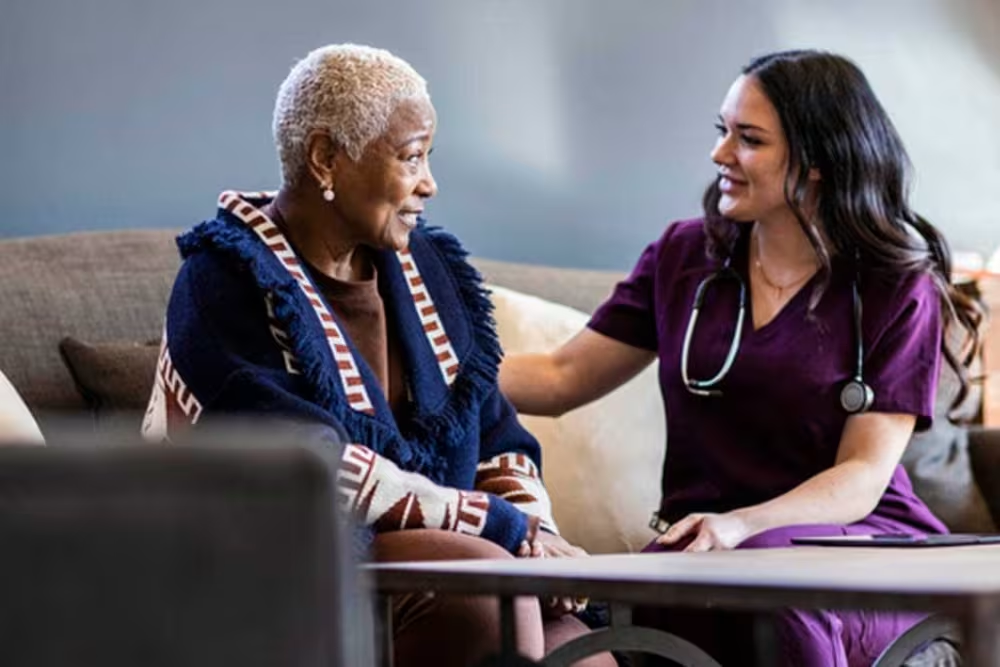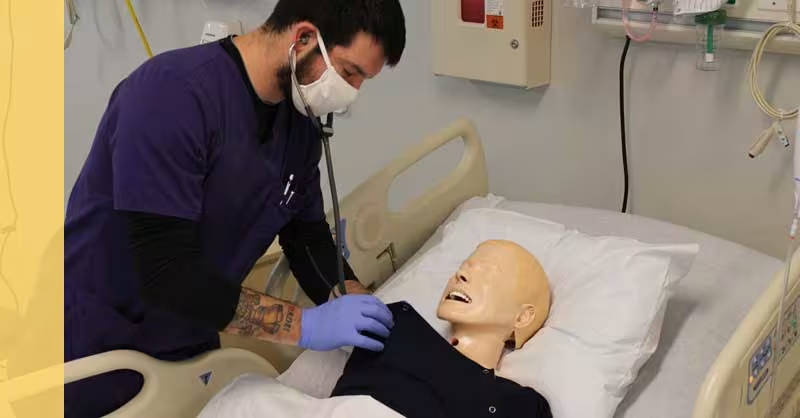What Are Clinicals in Nursing School?
Each blog post is dated and contains accurate information as of that date. Certain information may have changed since the blog post publication date. If you would like to confirm the current accuracy of blog information, please visit our ABSN overview page or contact admissions at (866) 891-1371.
What are clinicals in nursing school and why is clinical experience important in nursing? During clinicals, you’ll be placed in an actual nursing unit, where you’ll provide direct patient care under supervision. Clinicals give you invaluable experience in working with patients and responding appropriately to a range of nursing situations.

When you become a nursing student, you’ll work through a rigorous curriculum that blends online coursework with skills labs and nursing simulation labs. You’ll also do multiple clinical rotations, which are commonly referred to as “clinicals.” What are clinicals in nursing school and why is clinical experience important in nursing? You can learn all about clinicals here.
At Concordia University Texas, our Accelerated BSN track includes multiple clinical rotations to introduce nursing students to a wide variety of clinical environments, enabling them to practice delivering direct patient care under the supervision of their preceptor. If you’re thinking of switching to a career in nursing and you have prior non-nursing college education, connect with one of our helpful admissions counselors today to discuss enrollment.

Learn about the five steps for getting into nursing school at Concordia Texas here!
Clinical rotations are like the internship of the nursing world, providing not only valuable on-the-job experience, but also opportunities to network with working professionals and impress prospective employers. For each clinical rotation, you’ll be assigned to a specific unit in a healthcare facility. You’ll have an instructor, who is a registered nurse (RN) and will serve as your supervisor. Your instructor provides direction and can answer any questions you may have.
How do clinicals work in nursing school? At the start of each shift for your rotation, you’ll have a team meeting or pre-conference. You’ll discuss the plan for the day and go over your assigned patients. This is also a good opportunity to ask any lingering questions you may have. During your shift, you’ll perform nursing tasks, such as taking vital signs, performing assessments, administering medications and assisting with the activities of daily living (ADLs).
Why Is Clinical Experience Important in Nursing?
In nursing school, you’ll work on developing nursing skills during your skills labs and learn to respond appropriately to various patient scenarios in your nursing simulation labs. However, there’s nothing quite like practice in an actual hospital to cement your skills. You’ll learn a great deal every single shift, and work with experienced nurses who can offer guidance along the way.

Learn more about skills and simulation labs in nursing school here!
How Do Clinicals Prepare You for a Nursing Job?
Healthcare employers need to know that the nurses they hire will be able to deliver appropriate, competent and high-quality care that prioritizes patient health and safety. No matter how well you excel in skills and simulation labs, you’ll need to put your skills to the test in realistic settings, such as by providing actual patient care in a hospital. Clinical rotations will give you the opportunity to develop a greater level of nursing competence. Students will emerge from the track feeling more confident in their nursing skills.
9 Ways to Make the Most of Your Clinical Practicums
By now, you should have a fairly good idea of the answers to the questions, “How do clinicals work in nursing school?” and “Why is clinical experience important?” Clinical practicums serve two very important functions: to provide experiential learning with actual patients and to help you get comfortable in the fast-paced, unpredictable world of healthcare so that you can work on gaining confidence with providing patient care. Use the following tips to get the most out of your clinicals.
1. Don’t Be Afraid to Ask Questions
A lot of people shy away from asking questions because they’re afraid of looking like they don’t know something. This logic is counterintuitive, though. There’s no shame in admitting you don’t know something; to the contrary, it shows a desire to learn and improve. Whether you have a technical question or don’t know how to process an emotional situation — something many new nurses struggle with — don’t be afraid to ask.

2. Come Prepared
It’s essential that you show up at your practicums prepared. That means completing your assigned readings and any other work related to your assignments in advance. While there may not be such a thing as a stupid question, asking questions that make it clear that you didn’t do the assigned prep work isn’t going to impress anyone. Not only that but failing to do the necessary legwork could put patients at risk.
Another aspect of coming prepared? Showing up in clean, unwrinkled scrubs. Remember, you represent your school and the clinical location.
3. Be Professional
Another answer to the question, “Why is clinical experience important?” is that it allows you to practice working with a wide variety of people. Some patients and their families will try your patience. In these situations, remember what they’re going through and have empathy. Likewise, you may encounter a nurse or doctor who isn’t ecstatic about having student nurses around. Whatever the case, be patient and respectful.
Additionally, be sure to learn the names of the people on your assigned unit. If, like many people, you have trouble remembering names, write them down.
4. Ask for Help
There’s always a chance that someone will ask you to do something you don’t know how to do. No matter how eager you are to impress, do not attempt it. Rather, explain that you don’t know how to do whatever it is you’ve been asked to do, but that you would love the opportunity to watch and learn. Be honest about your strengths and weaknesses.
5. Go Above and Beyond
One of the best ways you can make a good impression on the staff nurses—as well as gain additional experience—is to ask them how else you can help. Demonstrating a willingness to help and learn in any way you can is a surefire way to be remembered as the kind of person the nurses will want to work with.

6. Be Organized
Outside of hands-on labs and nursing clinicals, you can expect to spend 40 hours or more a week writing papers, reading, learning about medications and more. Knowing this, it’s crucial that you find a way to stay organized at all times. Invest in a day planner and write down must-do items as soon as you’re assigned them.
7. Find Your Support System
Throughout the ABSN track at Concordia University Texas, you will be surrounded by like-minded peers from various backgrounds. These individuals will serve as your biggest support system, so it’s essential that you reach out to them for support when times get challenging. Consider organizing a study group shortly after beginning the track. It’s an opportunity to connect with your cohort members while also staying on top of your work.

As you prepare for nursing school, you may find these eight pieces of advice for nursing students helpful!
8. Go into Each Clinical with an Open Mind
Beyond the nursing specialty you may think you would like to pursue, it’s important that you go into each clinical with an open mind to receive the best experience. For example, you may start clinicals wanting to pursue the emergency room (ER) and then completely change your mind after caring for infants in pediatrics.
9. Take Time for Yourself
While eating, sleeping, and breathing the ABSN track may seem like a good idea, it can also be a recipe for disaster. To prevent this from happening, be sure to take time for yourself. Whether this involves taking a walk, attending an exercise class, or meeting up with friends, taking little amounts of time away from nursing school will benefit you in the long run.

Change Your Career Trajectory in as Few as 16 Months
Whether you always wanted to be a nurse but chose a different path or are rethinking your current career in favor of nursing, Concordia University Texas’s ABSN track can help you get there sooner.
Contact us today or fill out the form to find out if our accelerated nursing track is right for you. You’ll be assigned a dedicated admissions counselor, who will help you understand the eligibility requirements and what the track entails. If eligible, you could graduate with your nursing degree in as few as 16 months.
